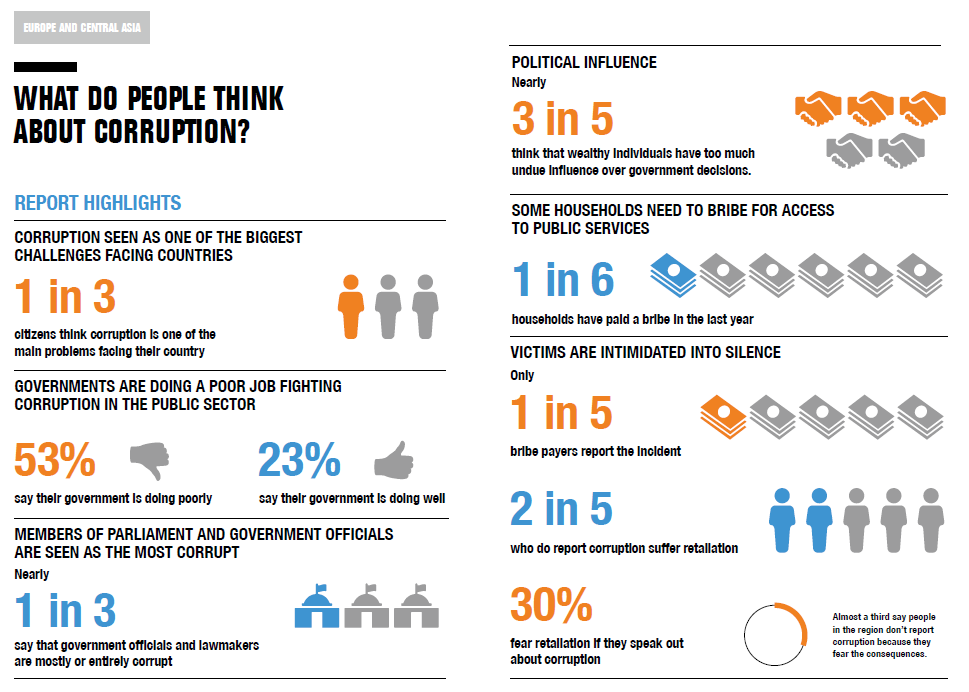Berlin, 16 November 2016 – One in three citizens of Europe and Central Asia think that corruption is one of the biggest problems facing their country, according to the report of Transparency International published today. This figure rises to two in three citizens in the cases of Moldova, Spain and Kosovo, demonstrating the need for urgent action to combat collusion and abuse of public power.
Nearly one-third of the citizens in the region believe that their government officials and decision makers is very corrupt, while most people think that their governments are not doing enough to curb corruption.
More than a half of citizens of the European Union (53 percent), the candidate countries for accession to the EU (53 percent) and the Commonwealth (CIS), most of the former Soviet republics (56 percent) said that their governments have failed in curbing corruption. Governments of Ukraine (86 percent), Moldova (84 percent), Bosnia and Herzegovina (82 percent) and Spain (80 percent) are the worst rated by their citizens.
Transparency International has talked with nearly 60,000 citizens from 42 countries of Europe and Central Asia about their experiences with corruption in daily life, for the needs of the new report People and Corruption: Europe and Central Asia, which is a part of the Global Corruption Barometer for 2016.
On average, one in six households paid a bribe in order to qualify for a public service. Although there are fewer households paying bribes for public services, in most EU countries, this percentage grows towards the east: the highest percentage is in Tajikistan (50 percent), Moldova (42 percent), Azerbaijan, Kyrgyzstan and Ukraine (38 percent), and Russia (34 percent). Romania had the highest percentage among the EU countries with 29 percent, followed by Lithuania with 24 percent.
In rich countries, almost two in every three citizens (65 percent) believe that the rich have too much influence on policy-making, compared with 44 percent in the EU candidate countries and 46 percent in the Commonwealth.
In Spain, 88 percent of citizens said that wealthy individuals had undue influence on government decisions. In Portugal, it was 85 percent, in France 79 percent, while in Germany and the UK it was 77 percent.
“Corruption is a significant problem all across the Europe and Central Asia region. In EU countries many citizens see how the wealthy and those in government distort the system to their advantage,” said José Ugaz, Chair of Transparency International. “Governments are simply not doing enough to tackle corruption because individuals at the top are benefiting. To end this deeply troubling relationship between wealth, power and corruption, governments must require higher levels of transparency, including around who owns and controls companies through public beneficial ownership registries.”
“By their very positions at the top of the power pyramid, corrupt elites and oligarchs are hard to remove. But we have seen that it can be done if people stand together to demand higher standards from their leaders and the judiciary acts independently to hold them to account,” said Ugaz.
Another key obstacle in the fight against corruption is the lack of protection of those who speak out about corruption. Thirty percent of respondents across Europe and Central Asia stated that the main reason why people do not report cases of corruption, the fear of the consequences. Two in five citizens who were “whistleblowers” have suffered retaliation.
There is also a stigma against those who dare to speak out and report corruption. That is especially the case in the Commonwealth countries, where only a quarter of people think that corruption reporting is socially responsible (27 percent).
A few citizens feel capable to help stop corruption in their respective countries: Less than a half of citizens (47 percent) in the EU countries feel that they could contribute to changing something in the fight against corruption, while the percentage drops to less than one-third (31 percent) in the Commonwealth countries.
Transparency International has issued four key recommendations to reduce political corruption and allow people to be reported without fear of reprisal. Governments around Europe and Central Asia should:
- Have transparent rules on lobbying and a public lobbying register, so that policy decisions can be better scrutinized.
- Ensure the independence of the judiciary, particularly in EU accession countries and the former Soviet Union, by reducing the influence of the executive over the judiciary and prosecutorial services and including transparent and objective systems for the appointment, transfer and dismissal of judges and prosecutors.
- Adopt and enforce comprehensive legislation to protect whistleblowers.
- Support whistleblowers and reporters of corruption and ensure appropriate follow-up to their disclosures.
Transparency International je global civil society organization that fights corruption
Note to editors: To see the full report click here. For a downloadable map showing bribery rates across Europe and Central Asia, click here. To see the previous reports on Africa and the Middle East and North Africa click here and here. Reports on the Americas and Asia Pacific are upcoming in 2017.
All figures, unless otherwise stated, are from Transparency International’s Global Corruption Barometer 2016. Two research companies organised the implementation of the Global Corruption Barometer 2016 question module in the Europe and Central Asia region. TNS Opinion collected the data using face to face household interviews. Efficience3 organised the implementation of the survey using Computer Assisted Telephone Interviews (CATI). In total 58,238 adults were interviewed between November 2015 until July 2016. The figures are weighted and are representative of all adults (aged 18+).
Media contact:
Natalie Baharav
Email: press@transparency.org
T: +49 30 3438 20 666




